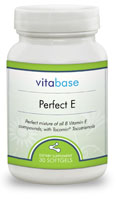Vitamin E succinate (VES) is a derivative of the fat-soluble vitamin d-alpha-tocopherol or dl-alpha-tocopherol. The general term vitamin E refers to eight naturally occurring and synthetic tocopherols and tocotrienols and their acetate and succinate derivatives. D-Alpha-tocopherol succinate is the succinate ester of natural-source d-alpha-tocopherol. D-Alpha-tocopherol succinate is obtained by the vacuum steam distillation and succinylation of edible vegetable oil. Dl-Alpha-tocopheryl succinate is an all-synthetic form of alpha-tocopherol. It is produced by coupling racemic isophytol with trimethylhydroquinone to form dl-tocopherol.
Although the naturally occurring forms of vitamin E have lipid-soluble antioxidant properties that protect cell membranes against damage by free radicals, the acetate and succinate derivatives that are esterified at the C-6 position of the chromanol ring do not have antioxidant properties unless the esterification is hydrolyzed and free tocopherol is regenerated. The succinate form is water-soluble and the acetate form is fat-soluble. Vitamin E Succinate takes vitamin E's antioxidant action a step further. Succinate feeds directly into the Krebs cycle, our major metabolic pathway for generating energy. This extra dimension from succinate significantly extends the protective properties of vitamin E.
Vitamin E succinate is may inhibit growth and induced apoptic cell death in estrogen-receptor-negative human breast cancer cell lines. Vitamin E succinate is a potent novel antineoplastic agent with high selectivity and cooperativity with tumor necrosis factor-related apoptosis-inducing ligand. Vitamin E succinate may be of clinical use in the treatment of aggressive human breast cancers, particularly those that are resistant to anti-estrogen therapy. Alpha-tocopheryl succinate can suppress the expression of prostate-specific antigen (PSA), a marker for the progression of prostate cancer. VES can also suppress androgen receptor (AR) expression by means of transcriptional and posttranscriptional modulation.
Vitamin E succinate enhances the immune response and induces cellular differentiation and/or growth inhibition. Patent Inhibitor of neuroblastoma. cells, murine melanoma cells, avian lymphoid cells, human HL-60 promyelocytic leukemia cells, and several human breast carcinoma cell lines. VES has been shown to modulate adenylate cyclase and cAMP-dependent protein, inhibit protein kinase C activity, bind to cellular vitamin E binding protein, suppress c-myc and c-H-ras oncogene expression, and regulate TGFb protein production. | 